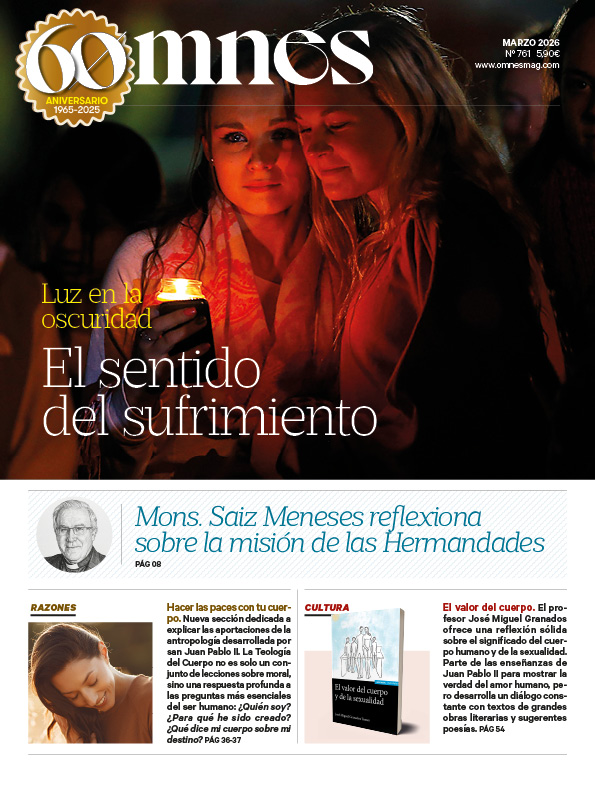"Next Sunday is the celebration of the World Mission DayI will canonize fourteen blessed, fourteen new saints. I invite you to get to know these new saints and to ask for their intercession, since they are a clear testimony of the action of the Holy Spirit in the life of the Church. May Jesus bless them and the Blessed Virgin Mary watch over them. Thank you very much.
Together with the prayer for peace in so many places, such as Ukraine, Palestine, Israel, Myanmar, Sudan, expressly mentioned, these were the final words of Pope Francis in the General Audience Wednesday, with numerous pilgrims in St. Peter's Square.
"Life in Christ, which gives meaning to our existence."
In his ninth catechesis on the Holy Spirit, this time dedicated to the Paraclete in the life of the Church, the Pontiff pointed out in his concluding words that "the Holy Spirit gives new life to all believers, life in Christ, which makes us children of God. This means that the Holy Spirit gives us eternal life, and this is the good news that gives meaning to our existence".
At the beginning, the Holy Father gave a brief historical overview. "Today we reflect on the presence and the action of the Holy Spirit in the life of the Church. In the first centuries of Christianity there was no need to explicitly formulate faith in the Holy Spirit".
Council of Constantinople, year 381
"It was the emergence of heresies, in the fourth century, that prompted the Church to define his divinity," he continued. "When this process began - with St. Athanasius, in the fourth century - it was the Church's lived experience of the sanctifying and divinizing action of the Holy Spirit that led her to the certainty of his full divinity."
"This happened at the Ecumenical Council of Constantinople in 381, which defined the divinity of the Holy Spirit with these well-known words that we still repeat today: "I believe in the Holy Spirit, Lord and giver of life, who proceeds from the Father [and the Son], who with the Father and the Son receives the same adoration and glory, and who spoke through the prophets". To say that the Holy Spirit is 'Lord' was like saying that he shares the 'lordship' of God, who belongs to the world of the Creator, not to that of creatures," the Pope said in his catechesis.
"Filioque"
Regarding the "Filioque", the reason for disputes between the Eastern and Western Church, the Pope pointed out: "In the past, we were mainly concerned with the affirmation that the Holy Spirit 'proceeds from the Father'. The Latin Church soon completed this affirmation by adding, in the Creed of the Mass, that the Holy Spirit proceeds 'also from the Son'. Since in Latin the expression 'and from the Son' is said 'Filioque,' this gave rise to the dispute known by this name, which was the reason (or the pretext) for many disputes and divisions between the Church of the East and that of the West."
"It is certainly not the case to deal here with this question," the Pope pointed out, "which, on the other hand, in the climate of dialogue established between the two Churches, has lost the harshness of the past and allows us to hope for full mutual acceptance, as one of the main 'reconciled differences'."
"Great and comforting news for us."
"Now, in the new creation," he added in his catechetical reflection, "it is the Holy Spirit who gives believers new life, the life of Christ, supernatural life, the life of children of God. (...) "Where is the great and consoling news for us in all this? In that the life that the Holy Spirit gives us is eternal life. Faith frees us from the horror of having to admit that everything ends here, that there is no redemption for the suffering and injustice that reign supreme on earth".
Another word of the Apostle assures us: "If the Spirit of God, who raised Jesus from the dead, dwells in you, the same Spirit who raised Christ from the dead will also give life to your mortal bodies through his Spirit who dwells in you" (Rom 8:11).
Finally, the Pope asked that "we should not forget to give thanks to the One who, by his death, obtained for us this inestimable gift!"
St. Ignatius of Antioch, tomorrow
In his final words, addressing the pilgrims in Italian, the Pope greeted the participants in the world convention of Radio Maria, coming from various countries, who spread the values of fraternity and solidarity; and various Italian groups.
He also recalled tomorrow's liturgical celebration of St. Ignatius of Antioch, "an ardent pastor of love for Christ. May his example help everyone to rediscover the joy of being a Christian.







